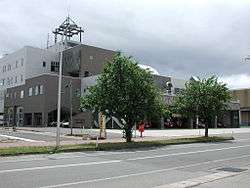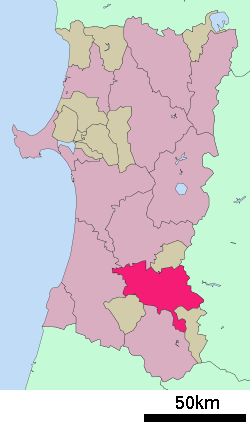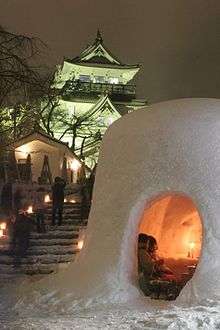Yokote, Akita
Yokote (横手市, Yokote-shi) is a city located in Akita Prefecture, Japan. As of 31 December 2019, the city had an estimated population of 89,574 in 34,240 households,[1] and a population density of 130 persons per km². The total area of the city is 693.04 km2 (267.58 sq mi).
Yokote 横手市 | |
|---|---|
 Yokote City Hall | |
 Flag  Seal | |
 Location of Yokote in Akita Prefecture | |
 Yokote | |
| Coordinates: 39°18′40.8″N 140°33′11.8″E | |
| Country | Japan |
| Region | Tōhoku |
| Prefecture | Akita |
| Area | |
| • Total | 692.80 km2 (267.49 sq mi) |
| Population (April 2019) | |
| • Total | 89,574 |
| • Density | 130/km2 (330/sq mi) |
| Time zone | UTC+9 (Japan Standard Time) |
| - Tree | Apple |
| - Flower | Sakura |
| - Bird | Swan |
| Phone number | 0182-35-2111 |
| Address | 1-1 Jōri 1chome, Yokote-shi, Akita-ken 013-8601 |
| Website | Official website |

Geography
Yokote is located in southeast corner of Akita Prefecture by the Ōu Mountains and Iwate Prefecture to the east. The Yokote River flows from the eastern Ōu Mountains through the city.
Demographics
Per Japanese census data,[2] the population of Yokote has been in decline for the past 70 years.
| Year | Pop. | ±% |
|---|---|---|
| 1950 | 148,075 | — |
| 1960 | 140,675 | −5.0% |
| 1970 | 124,160 | −11.7% |
| 1980 | 120,479 | −3.0% |
| 1990 | 115,761 | −3.9% |
| 2000 | 109,004 | −5.8% |
| 2010 | 98,378 | −9.7% |
Climate
Yokote has a Humid continental climate (Köppen climate classification Cfa) with large seasonal temperature differences, with warm to hot (and often humid) summers and cold (sometimes severely cold) winters. Precipitation is significant throughout the year, but is heaviest from August to October. The average annual temperature in Yokote is 10.7 °C. The average annual rainfall is 1666 mm with September as the wettest month. The temperatures are highest on average in August, at around 25.1 °C, and lowest in January, at around -2.0 °C.[3]
History
The area of present-day Yokote was part of ancient Dewa Province and was the homeland of the Kiyohara clan of the Heian period Gosannen War. At the end of the Sengoku period, the area came under the control of the Onodera clan, who ruled from Yokote Castle. However, the Onodera sided against Tokugawa Ieyasu at the Battle of Sekigahara and the area came under the control of the Satake clan, who had been relocated to Kubota Domain from their former holdings in Hitachi Province. Kubota Domain was uncommon in that it contained more than one castle, despite the Tokugawa shogunate's "one castle per domain" rule, and Yokote remained a secondary castle town under the Kubota clan until the Meiji restoration.
After the start of the Meiji period, the area became part of Hiraka District, Akita Prefecture in 1878, with one town and 23 villages. The modern city of Yokote was founded on April 1, 1951.
On October 1, 2005, the towns of Hiraka, Jūmonji, Masuda, Omonogawa and Ōmori, and the villages of Sannai, and Taiyū (all from Hiraka District) were merged into Yokote, which now occupies all of former Hiraka District, plus the villages of Meiji and Nishinarusei (formerly from Ogachi District), and the village of Kanazawa (formerly from Senboku District).
Government
Yokote has a mayor-council form of government with a directly elected mayor and a unicameral city legislature of 25 members. The city contributes four members to the Akita Prefectural Assembly. In terms of national politics, the city is part of Akita District 3 of the lower house of the Diet of Japan.
Economy
The economy of Yokote is based on agriculture.
Education
Yokote has seventeen public elementary schools and six public middle schools operated by the city government and five public high schools operated by the Akita Prefectural Board of Education. The prefecture also operates one combined middle/high school and one special education school for the handicapped.
Transportation
Railway
![]()
![]()
- Kurosawa - Komatsukawa - Hiraishi - Ainono - Yabitsu - Yokote
Local attractions
Local events
Kamakura Festival
Yokote is known for its Kamakura Festival, a midwinter festival in which igloo-like snow houses are made throughout the town. It is held in the days leading to the Bonden Festival (mid February) and its location is focused around the city hall area. Children and others sit in the kamakura and serve amazake and mochi to visitors. In addition, several stalls are situated around town serving other types of typical Japanese festival food, including the town's own meibutsu "Yokote yakisoba".
An altar for the water deity is carved into the rear of the room inside each kamakura, where people pray for abundant harvests, the safety of their family members, protection against fire and for academic success. In addition to the large igloos, there are mini-kamakura which are spread throughout the city. There are candles Inside the tiny snow domes. Some of the regular kamakura and the mini-kamakura are sponsored by local businesses and can sometimes look like an advertisement for a product (like a cell phone). The kamakura can be experienced year round in a building adjacent to Yokote City Hall called the Kamakura-kan. Inside, there are a few kamakura kept at a temperature of 10 °C (50 °F) and are open to visitors.
International relations
Twin towns/Sister cities
Yokote is twinned with:


Noted people from Yokote
- Keishi Handa, basketball player
- Makoto Hasegawa, basketball head coach
- Tatsuzō Ishikawa, author
- Kiyonomori Masao, sumo wrestler
- Yasushi Sasaki, movie director.
- Sayuri Sugawara, musician
- Yu Takahashi, musician
- Manabu Terata, politician
- Daisuke Usami, volleyball player
References
External links
| Wikimedia Commons has media related to Yokote, Akita. |
- Official Website (in Japanese)
- Yokote Tourism Website (in Japanese)